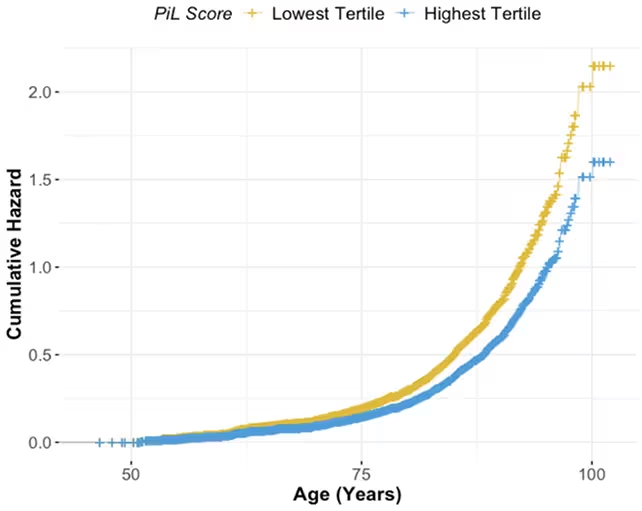4 Minutes
Study summary and key findings
A large longitudinal study from the University of California, Davis finds that people who report a stronger sense of purpose in life have a substantially lower risk of developing dementia. Researchers analyzed health and cognitive data from 13,765 adults aged 45 and older who took part in a U.S. population-based survey from 2006 to 2020, with follow-up questionnaires extending as long as 15 years.
After adjusting for age, sex, education, depressive symptoms and genetic risk, participants with a higher sense of purpose showed roughly a 28% reduction in the likelihood of developing dementia. In addition to lower incidence, when cognitive decline occurred it tended to begin later in life for the higher-purpose group.

Having more of a purpose (blue) was associated with a lower dementia risk over time. (Howard et al., Am. J. Geriatr. Psychiatry, 2025)
The association does not prove causation, but the investigators controlled for several major confounders including APOE4 status, a key genetic risk factor for Alzheimer’s disease. This makes the link between psychological well-being and brain health more robust than many prior smaller or shorter-term studies.
Scientific background and study design
Sense of purpose is a psychological construct measuring whether someone feels their life has direction, goals, or meaning. Prior research has tied purpose to reduced mortality, better cardiovascular outcomes, and healthier behaviors. This UC Davis analysis extends those observations specifically to dementia risk across midlife and older age.
Methods
The team used standardized questionnaires to assess participants’ sense of purpose and cognitive status, then modeled incident dementia across the follow-up period. Statistical models accounted for demographic variables, education, depressive symptoms (a common comorbidity with cognitive decline) and genetic risk via APOE4 carrier status.
Explaining APOE4: Apolipoprotein E (APOE) has multiple variants; the APOE4 allele increases risk for late-onset Alzheimer’s disease. Adjusting for APOE4 helps separate genetic susceptibility from psychosocial influences on dementia onset.
Implications and practical applications
The study supports the idea that psychosocial interventions could complement biomedical approaches to dementia prevention. While recently approved Alzheimer’s drugs such as lecanemab and donanemab can modestly delay cognitive symptoms, they carry costs and potential adverse effects. By contrast, cultivating purpose is low-cost, broadly accessible, and generally safe.

Researchers suggest purpose can emerge from relationships, meaningful work, spiritual faith, volunteerism, or goal-directed activities. Public health strategies that foster social engagement, community roles, and lifelong learning may therefore contribute to cognitive resilience.
The mechanism linking purpose and delayed cognitive decline remains uncertain. Possible pathways include reduced stress and inflammation, healthier lifestyle choices, stronger social networks, or greater cognitive reserve—the brain’s capacity to cope with pathology.
Conclusion
This large, long-term study reinforces earlier evidence that a strong sense of purpose correlates with lower dementia risk and later onset of cognitive decline, even among people with genetic susceptibility. While more research is needed to clarify causality and effective interventions, the findings highlight psychological well-being as a viable target in dementia prevention strategies. Adopting meaningful goals, maintaining social ties, and engaging in purposeful activities are practical steps people can take now to support long-term brain health.
Source: sciencealert


Leave a Comment